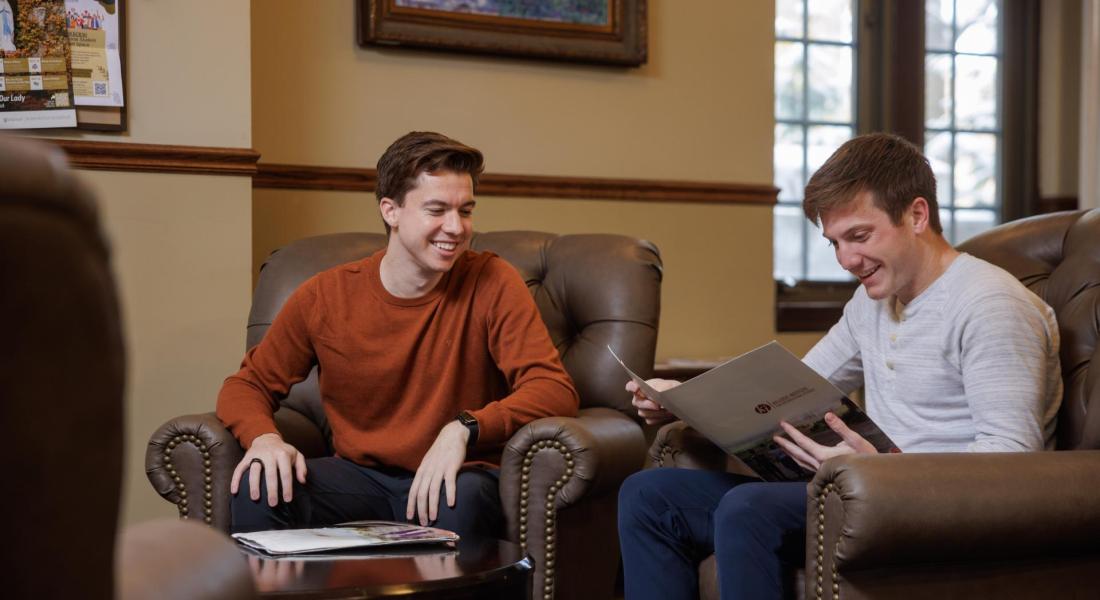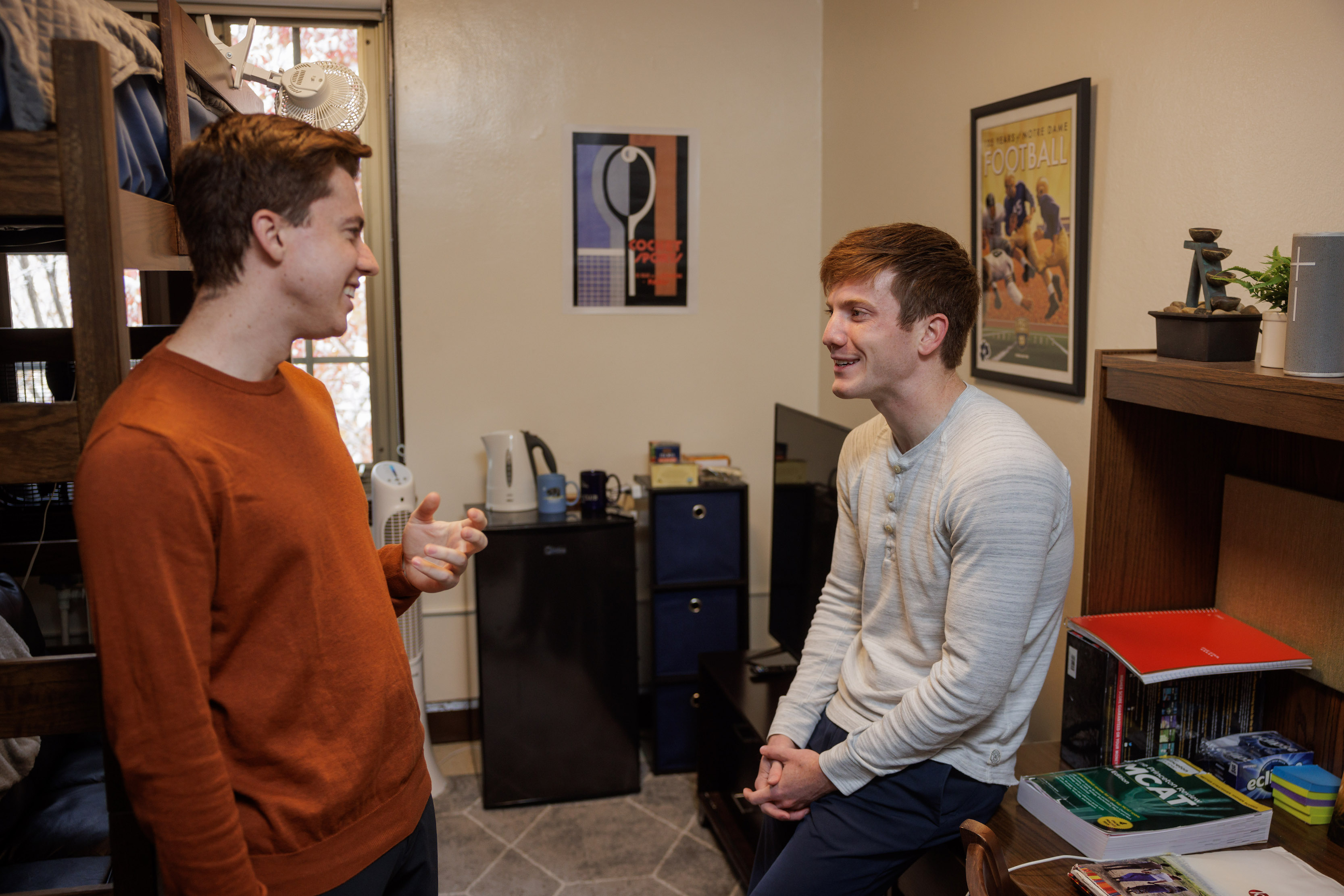
Undergraduate students who have taken on Kellogg’s International Development Studies (IDS) minor over the past 14 years have learned through their experiences in the program that they can apply what they learn in the classroom to the real world, and that they can adapt and apply what they’ve learned in each context to their post-graduate work. Two brothers, Joe and Jack Drey, who both pursued the IDS minor at different times, from different disciplinary approaches – one from a political science and education perspective and the other from a global health perspective – agree that through the program they’ve grown in confidence and have learned how to carry out scholarly research projects that can have a real global impact.
“Kellogg has the model now of ‘do hard things’ and that’s really true,” says Joe, undergraduate program associate at the Keough School of Global Affairs, where he works with the Inspired Leadership Initiative. Joe graduated in 2020 with a BA in political science and an IDS minor.
“I couldn’t study international development from the safety of campus. I needed to get out and explore, meet other people, really get a feel for what development was,” he says. “I learned a lot through this experience. I was able to conduct an independent research project by myself in another country.”
Kellogg Senior Strategic Advisor Steve Reifenberg, who also directs the IDS minor and teaches one of the IDS elective courses, International Development in Practice, advised Joe on his IDS capstone project on understanding Samoan food culture and how this understanding might benefit food policy within the region of Apia, Samoa, and Auckland, New Zealand. He received a Kellogg/Kroc Undergraduate Research Grant to carry out the research project.
Previously, as a sophomore, Joe traveled to Accra, Ghana, through an Experiencing the World Fellowship, where he conducted interviews and surveys in order to better understand drivers of food choice in a country whose diet is shifting from traditional to Western.
“Education was kind of the backbone of all my projects – realizing that education needs to be context specific,” says Joe, who is now in the education entrepreneurship masters program at the University of Pennsylvania. “I did a lot of thinking about how we can create education around food, food security, health, and food choice that resonates with the actual learner – learner-centered design. This has been influential with my work on building classes at Keough with Steve Reifenberg.”
In his role at Keough, Joe works alongside Reifenberg in developing coursework for the Summer Scholars pre-college program, for adult students in the Inspired Leadership Initiative program, and for the International Development and Practice class, among others, for undergraduate students.
“Joe’s been a partner in a lot of the innovative curricular development, particularly for a new course called Life Design: The Art and Science of Human Flourishing. He’s been really creative in helping build out the curriculum side of this Inspired Leadership initiative,” says Reifenberg. “His IDS experience is part of what made him a good fit for this role.”
The IDS minor provides undergraduate students with the opportunity to learn about and contribute to international development discourse and practice. Notre Dame du Lac Associate Professor of Sociology Erin McDonnell teaches the research methods course and says it’s a privilege to guide students and help them cultivate skills that they will use for the rest of their lives and careers.
“We require them to obtain funding, plan their travel, live on their own in a country they’ve never been to, execute high-level organizational project management and more. These are the skills that have led my students to stand out in job interviews,” says McDonnell. “Notre Dame students have this tremendous desire to engage globally, and this coursework and fieldwork challenges them and equips them to do that.”
 Joe’s brother Jack is a senior majoring in biological sciences with an IDS minor and a minor in classical studies. Jack received a Kellogg/Kroc Undergraduate Research Grant to conduct his research in Kenya. He’s in the process now of finishing up his capstone project entitled, “From Stress to Success: Analyzing the Role of Mentorship in Overcoming Barriers to Girls’ Education in Kisumu, Kenya.”
Joe’s brother Jack is a senior majoring in biological sciences with an IDS minor and a minor in classical studies. Jack received a Kellogg/Kroc Undergraduate Research Grant to conduct his research in Kenya. He’s in the process now of finishing up his capstone project entitled, “From Stress to Success: Analyzing the Role of Mentorship in Overcoming Barriers to Girls’ Education in Kisumu, Kenya.”
“Doing field research in Kenya this summer was an incredible experience – to really interact with people and a new culture in a meaningful way and put into practice all the things we were talking about in class,” says Jack. “I’m building research skills, growing my ability to adapt to new circumstances, and connecting with professors and other IDS students. The classes really prepared me to go out in the field and helped me understand the concept of accompaniment and how to turn all those theories into actual practice.”
Marie Donahue, director of the Global Health Minor and an associate teaching professor at the Eck Institute for Global Health, is Jack’s IDS capstone advisor. She helped him develop his project, compose interview questions, and analyze the data.
“The number one rule is that you don’t impose, you partner with,” says Donahue. “It should be a true partnership. The accompaniment approach to development work is the most important part. You don’t go in and tell people what to do, you learn the context from them and partner with them in the research process.”
In addition to interviewing teachers, parents, and mentors at 12 different schools for his research project, Jack also learned about the regional cultural history of Kisumu, Kenya, experienced a traditional dinner, and learned how to do a traditional dance. According to Jack, all of this took him way out of his comfort zone and helped him build his confidence in ways he wouldn’t have otherwise been able to.
“The coursework and fieldwork required for the IDS minor really challenge students to get out of their comfort zones, to thoughtfully and respectfully engage with people across the globe, and to contribute serious and significant scholarly research during their undergraduate years,” says Kellogg Associate Director Holly Rivers, who manages the IDS minor, along with several other experiential learning programs for independent research in countries around the world.
The IDS minor is interdisciplinary in nature and equips students with the broad lens through which to view and investigate international development challenges. Regardless of what career path IDS students follow, the breadth and diversity of academic and fieldwork training help prepare them to apply their learning from the classroom to the world around them.
“The IDS minor was created by Rev. Robert Dowd and combines thorough and practical preparation, support when students are overseas, and then pathways to reflect on the experience and synthesize their data,” says Reifenberg. “Kellogg and Keough have built this powerful sequence of courses and experiential learning that really helps our most motivated students initiate and successfully carry out individual research projects that serve them when they go out for job interviews, and serves them when they’re applying to graduate school.”
As Jack approaches graduation, he has plans to pursue medical school after a gap year. Beyond that, he’s still figuring it out. But he knows for sure after his IDS experience that he can do hard things, and that he can apply what he’s learned in the classroom and in the field to whatever path he chooses.
The Kellogg Institute for International Studies, part of the Keough School of Global Affairs at the University of Notre Dame, is an interdisciplinary community of scholars and students from across the University and around the globe that promotes research, provides educational opportunities, and builds partnerships throughout the world on the themes of global democracy and integral human development.





